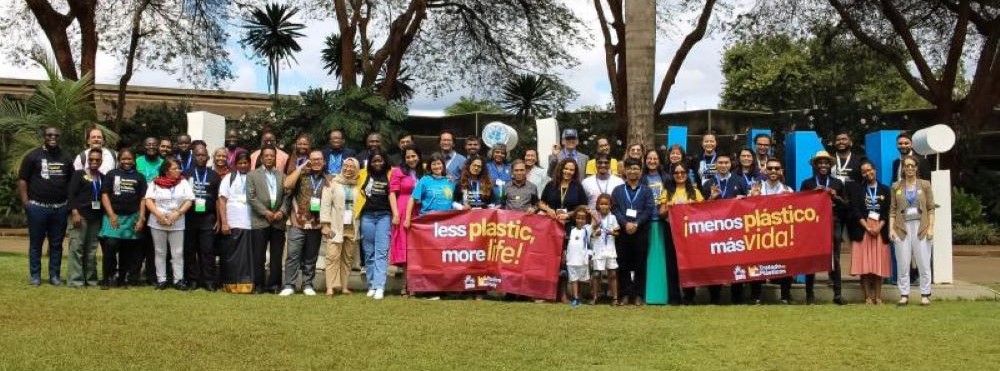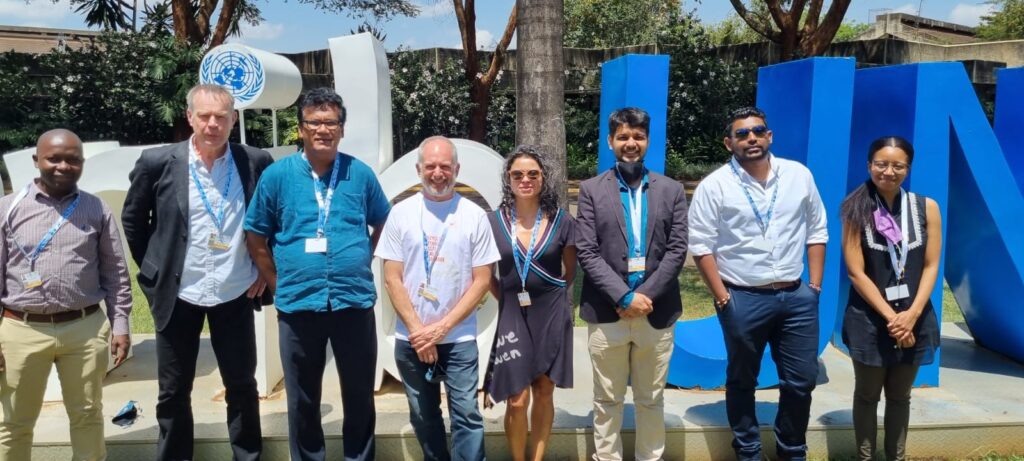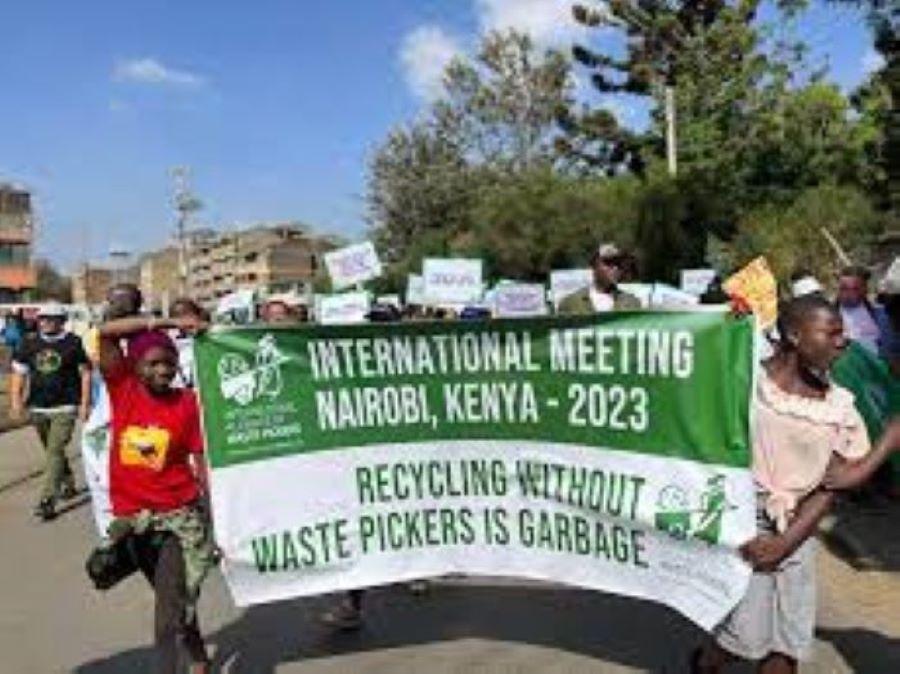In November 2023, Kenya played host to the Third Session of Intergovernmental Negotiating Committee (INC) session.
The session was aimed at coming up with a new international treaty to tackle plastic pollution, with main focus being Plastic Credits, a module where plastic producers compensate for removal of the wastes from the environment.
But even though the concept is fast gaining ground, a section of players now feel the focus should be on reduction of the production of plastics, as opposed to removal from the environment.

Anti-plastics
Environmental conservationists see plastic credits as a tactic for companies that rely on single-use plastic to avoid changing their business models.
Break Free From Plastic (BFFP) and the Global Alliance for Incinerator Alternatives (GAIA) claim that plastic producers use the credits concept for corporate greenwashing.
The two entities presented their case on the sidelines of UNEP-led negotiations in Nairobi, where they discredited the credits concept at ‘flawed tool that won’t help with worldwide pollution from the material.’
Without the proper funding mechanisms and tools, even the most ambitious treaty won’t deliver its promised impact
Kristen Linscott, Senior Program Officer for plastics policy and markets at Verra
In their presentation, the entities highlighted what they termed as ‘serious flaws in financing, transparency and basic auditing,’ in the arguments put forward by proponents of plastic credits; Verra and the Plastic Credit Exchange (PCX) Marketplace.
Verra, the world’s leading certifier of carbon offsets argued that plastic credits can be a tool for mobilizing the money needed to tackle plastic pollution.
“The finance associated with the treaty is near as important as its ambition,” Kristen Linscott, Senior Program Officer for plastics policy and markets at Verra, said in a presentation.
“Without the proper funding mechanisms and tools, even the most ambitious treaty won’t deliver its promised impact,” Kristen added.
Plastic Credits
Just like Carbon Credit, the Plastic Credits is a concept that involves plastic producers and users paying for a specified weight of plastic waste collected from the environment.

Nairobi’s global talks were meant to develop an international legally binding instrument on plastic pollution on land at sea among other water bodies.
The gathering was the third in a compressed five-meeting schedule intended to complete negotiations by the end of the year 2024.
Most of the world’s nations, petrochemical companies, environmentalists and others affected by the plastic pollution attended the talks.
Why Plastic Credits won’t work
However, BFFP movement and GAIA say plastic offsetting fails to deliver on its basic promise of helping companies reduce impact on the environment, and instead substituting one type of fossil fuel for another by burning plastics instead of coal.
“Businesses that wish to act more sustainably are better served by reducing plastic use across their operations, and not attempting to offset it,” noted a presentation by the two entities.
Often, companies are buying credits under the assumption that they are going to be helping the environment and removing plastic when actually in a lot of cases they are just transforming that pollution from plastic pollution into toxic air pollution
Emma Priestland, Global Corporate Campaigns Coordinator at BFFP
In their presentation, they claimed that Verra has just one project issuing credits, while most of the projects on PCX’s database generate credits from sending waste to be burned rather than recycled.
Verra and PCX are among companies that engage in credits trade or organize credit-generating activities.
“Often, companies are buying credits under the assumption that they are going to be helping the environment and removing plastic when actually in a lot of cases they are just transforming that pollution from plastic pollution into toxic air pollution,” said Emma Priestland, Global Corporate Campaigns Coordinator at BFFP.
They claimed that some projects are claiming credits for infrastructure-built years before, and there are ‘serious doubts’ about the additionality of Verra’s plastic credit program.
“The plastic crisis is too large and imminent to be solved by a single solution or mechanism,” they added.
PCX however holds that verified plastic credits can help fund collection, transportation and processing of the eight billion tons of legacy plastic pollution.
The entity’s Chief Executive Officer Sebastian DiGrande dismissed BFFP and GAIA presentation as containing ‘widespread and significant inaccuracies and misrepresentations’ including claims it already refuted.
Uphill task in riding the world of plastics
According to Nina Kelsey, Associate Professor of Public Policy and International Affairs at George Washington University, it has been tough for some companies to accept producing less plastic from their factories.
“So they do something that is a bit easier, which is to pay to have that same amount of plastic removed from the world,” Kelsey said.
Kelsey claimed it was a good thing to encourage people to take plastic waste out of the environment, but it’s not as good as putting less plastic into the environment.
Verra, in its response said that plastic credits in its program have been issued to more than one project, and its plastic program enables new or scaled-up projects to issue credits for plastic waste collection or recycling activities after completing a robust development and assessment process.

Verra also denied claims that plastic credits are greenwashing instruments or a false solution.
“A lot of the knee-jerk reaction or greenwashing assumption comes from an assumption that plastic credits are the perfect solution,” Linscott said. “Plastic credits are just a tool to be there on the transition to this world we hope to live in where there is no plastic pollution.
Environmentalists argued that issuing credits for plastic burned in incinerators and cement kilns encourages that burning, adding that it puts more toxic chemicals into the environment.
“Plastic credits create a new problem because the pollutants become more spread out and they are invisible,” said Yuyun Ismawati, Senior Advisor of Nexus3 Foundation and Plastic Advisor for the International Pollutants Elimination Network Plastic.
Ismawati advocates for communities in Indonesia who are affected by pollution from plastic credits projects.
“They’re going to push back against a ban because you’re taking away their income,” said Neil Tangri, Science and Policy Director at GAIA, who contributed to the report. “There is a competition here and they don’t recognize the dynamic that they’re creating,” he added
.
